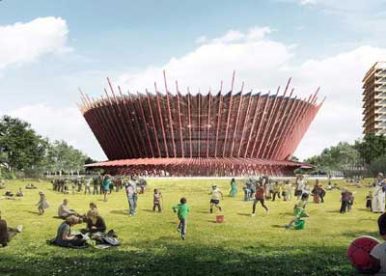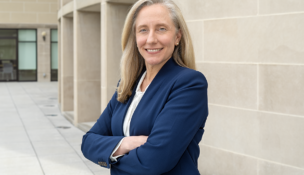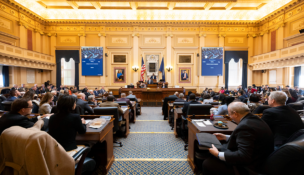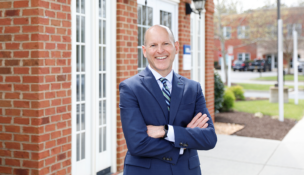The Visionary
Superstar Pharrell Williams has a dream for Virginia
Kate Andrews //January 30, 2022//

Pharrell Williams speaks during a panel discussion at his November 2021 Elephant in the Room economic conference at Norfolk State University. Photo by Leigh Vogel/Getty Images

Pharrell Williams speaks during a panel discussion at his November 2021 Elephant in the Room economic conference at Norfolk State University. Photo by Leigh Vogel/Getty Images
The Visionary
Superstar Pharrell Williams has a dream for Virginia
Kate Andrews //January 30, 2022//
The online version of this article includes additional material from Virginia Business’ interview with Pharrell Williams.
Pharrell Williams is a 13-time Grammy winner, an Oscar nominee, a fashion designer, a film producer, a music superstar and innovator. He’s also a native Virginian — a point that comes across strongly when he discusses his business ventures and his hopes for his home state.
Within the past few years, Williams, 48, has focused attention on economic development in his hometown of Virginia Beach and neighboring Norfolk, most famously with his April 2019 Something in the Water music festival and the Atlantic Park surf park project under development now at Virginia Beach’s Oceanfront. He also has become something of a patron for Norfolk State University, delivering commencement addresses in 2020 and 2021, as well as last year launching the Elephant in the Room economic conference, a local event he likens to Davos, Switzerland’s World Economic Forum, but focused on the need for equity and diversity in economic development. Last fall, his nonprofit, Yellow, opened its pilot Yellowhab charter school in Norfolk, with plans to open more in the future, focusing on individual learning styles and preparing students for college and the workforce.
Williams’ focus on his hometown has not been without struggle and heartache. In March 2021, his cousin, Donovon Lynch, was shot and killed by a Virginia Beach police officer, and last August, a special grand jury found no probable cause to charge the officer. Williams and other family members have called for further investigation into the shooting, and the tragedy remains a point of pain for the singer.
In September 2021, Williams decided to cancel Something in the Water, which had an economic impact of $24 million in 2019, saying in a letter to the city administration that he believes Virginia Beach is run with “toxic energy.” He wrote, “I wish the same energy I’ve felt from Virginia Beach leadership upon losing the festival would have been similarly channeled following the loss of my relative’s life.”
In January, Williams, who primarily lives in Miami, sat down with Virginia Business to discuss his business endeavors in Hampton Roads, the future of Something in the Water, and how he hopes to make the business case for greater diversity and equity — focusing on “green” rather than Black and white, or red and blue politics.
Virginia Business: What are your plans in Virginia for 2022?
Pharrell Williams: I really want to see us do better as people. I want to see programs, activation, businesses and groups really work together to advance us to a higher level. I think in my own prospective businesses, I think it’s just about us working.
VB: How is Atlantic Park, the surf park and entertainment center you’re developing in Virginia Beach, coming along?
Williams: I was excited to be a part of it, and I am still excited to be a part of it, but … I think Atlantic Park was like my first entrée into understanding that there were some systemic issues with the city. Because while it was a beautiful project and it’s destined to be a big attraction for the Oceanfront and the ViBe [Creative] District, we were met with a lot of resistance. The resistance that we were met with was in terms of things that inhibited the momentum.
We were met with differing philosophy — down to what direction the Oceanfront should go … and we were met with, at certain times, just full-on stagnancy. When I began to ask questions to try to make sense of these things, the answers were … never anything factual. It was always about opinion, and I began to glean favoritism.
That’s when I realized that it wasn’t as unified as it needed to be. Recently, after the death of my cousin, Donovon Lynch — the way that it was handled and a lot of the energy around it — and a couple of other things, it pushed me back a bit.
That’s when I just publicly said, “Listen, if the city wants to support me at this point, the only thing that I’ll be thinking about is this project.” I think it actually will have more than just the benefit to the Oceanfront, but there’d be a big benefit to the whole city of Virginia Beach. I wanted to focus my energy there, because I felt like in all other aspects, I’ve just been let down.
I said, if the city really wants to support me, then get behind a project that’s going to encourage some of the other people in the business community to broaden their horizons. Virginia Beach is Virginia Beach, but Virginia Beach honestly is one city in a very powerful state. The state of Virginia has been very influential.
VB: You’re also part of a team proposing the Wellness Circle, a $1.1 billion redevelopment plan for Norfolk’s Military Circle Mall, which would include a 15,000-seat arena and a 1-mile trail to be called the Wellness Loop. There are several competing redevelopment plans, but can you tell us about why you got involved with it?
Williams: I heard about the opportunity and that the city was looking for a partner or partners to come in and bring a fresh vision to the region. I immediately thought about the problems. I love turning problems into solutions and then, therefore, assets.
There’s still a sense, even though it might not be racial, there still seems to be a financial and economic segregation. Even if [it’s] not totally planned, the instincts are leaning that way, and that is not a community that’s working together. So, we proposed a project that was centered around an arena because literally, the amount of talent and athleticism that is born and bred in the 757 is unreal. It’s insane.
We need some professional teams here. Whether it’s basketball or hockey, which are two things that I’m working on, we need an arena. Around that arena should be a hotel, [and] there should be food and beverage. There should also be retail. There should also be an automotive partner, who probably runs on electric — that’s probably the most I can say about that. Then we need single-family, market-rate homes, right?
We also need not “affordable houses,” because “affordable” in real estate is an abused term that is appropriated for other things, so we don’t say “affordable.” It needs to have federally subsidized, transitional, workforce housing. I came from that myself. We want it to be transitional.
We want it to be a three- to five-year program where there’s a social worker in place right there to help you identify what you’re really good at. Whether it’s putting you directly into that vocational experience, or sending you to school to figure out what is for you, but transitional. You’re there to get a leg up, figure it out, get out, get on your own and inspire the next person that was just like you.
What I’m describing here is like a chartered community. We know how charter schools work, right? They have wraparound services, so what happens is it ensures the child gets everything that they need. What about making sure the community gets everything that they need? It’s a chartered community. Because literally, maybe [the next] Pharrell [is] coming out of my housing project.
I can come outside, and I look across the campus, and I see a doctor coming out of his single-family, market-rate home, or he’s walking to work. There’s a program over there that’s teamed up with one of the colleges — hopefully, Norfolk State University — that’s over there training folks in the medical field to get ready for their vocation.
Then across the other side of the campus is where the arena is, which is the natural attraction. That keeps the blood pumping, that’s the heart. Everyone [will come] in from a five-hour radius, about 22 million people, if I remember correctly.
Forget Pharrell Williams. You might just be the next Missy Elliott, or you might just be the next Allen Iverson. You might just be the next Pusha T, or the next architect or next academic or next artist, the next author, the next astronaut.
VB: Speaking of charter schools, how are things going at your pilot Yellowhab school in Norfolk?
Williams: I’m very proud of all the work that the folks over at Yellow are doing. It’s thriving because, again, we planned against the pandemic. We weren’t waiting at the mercy and the hands of what could have and what might happen — at the center of which were the needs of these kids.
[I’m] super proud of this partnership that we have with [The] Boeing [Co.], who’s … going to help us build our flagship school, hopefully at the Wellness Loop [at Military Circle]. They’ll be the ones that are helping us when the Lord blesses us with the Wellness Loop. There’s also talks about [starting a school] in Arizona. We’re also in talks in New York, which is super exciting.
We look at it like we want to radicalize education. Education is absolutely broken in the country. We have to meet the kids halfway.
VB: What do you mean by meeting kids halfway?
Williams: Let’s take someone who is dyslexic for a second. There’s a broad spectrum of dyslexia. What you find in a lot of people who have dyslexia, they usually tend to be incredible or exceptional musicians. They end up being exceptional architects. Usually, they end up being artistically superior in other disciplines that are beyond reading numbers and letters. The school system now is primarily graphemic [written communication]. It is also auditory, and it’s also visual as well, but primarily graphemic.
At Yellow, it’s all about assessing how the child learns, how the child retains and how the child applies. The curriculum … is more catered and more aligned with the way that you learn, retain and apply. That, to me, is super important. Because it changes the conversation. That’s how you meet a child halfway.

VB: What is happening with Something in the Water? Do you ever expect to hold it again, even if it’s someplace else?
Williams: Yes, for sure I have to. Something in the Water — when you talk DMV, they always say, “Man, whether it’s Missy Elliott or Timbaland or Chad Hugo or Michael Vick, it must be something in the water.”
We were willing to bet that would [unify] our home, and also show some of the places of business that they didn’t need to be intimidated by Black people. When there are various agencies and groups [that] continue to push out stereotypes about us, it causes other people who [have] not really taken the extra step to learn or come visit some of our neighborhoods and try to be a part of the solution of change — they start to believe in them.
We are more than your music and food and all the things that you attribute to us when you want to be nice. We’re more than that. We are human beings. God put us on the planet. As dark as our skin is, there’s a lot of light that comes from us.
I think that a lot of the businesses were very appreciative. I think they showed up and did what they were supposed to do. James Cervera [Virginia Beach’s former police chief, who approached Williams about starting the festival] is our hero. They had a problem with the students when they came down [for spring break]. He asked me what I thought we could do. He was the one that agreed with me when I said, “Let’s do a festival.”
The next thing you know, the hotel association, the restaurant association and all those things, they all showed up.
But then, you know how they say, when you take your eye off of the prize for a second, … groups maybe decide that they want to go back to their instincts with their idle time. The fear built back up [and] next thing you know, it goes right back to where it started.
Some of that rubbed me the wrong way when it came to the handling of my cousin’s murder. It was very particularly off-putting when they were so concerned about the future of the festival, but they weren’t concerned about the future of my cousin’s life. They weren’t concerned about the future of my cousin’s legacy and painted him in a way that he wasn’t.
The point [of Something in the Water] still stands, but while we have a community that’s getting to accept such toxicity and extending toxicity, I can’t be a part of that. Atlantic Park … still represents a brighter future. You know what, the citizens and the patrons will get together. They’re going to unify. They don’t need me for that. This is their homework.
VB: During your December 2021 graduation speech at Norfolk State, you said that Norfolk will be a different place in five years. What do you hope to see in terms of equity?
Williams: Well, I was thinking about that because we knew with [the] Elephant in the Room [economic conference], that is going to be our dialogue. We’re already talking to corporations about it. They’re all excited about it. … When we did the first Elephant in the Room last year, there were financial institutions that represented north of $9 trillion in investments.
What some people are afraid of, these corporations are attracted to. They love the potential influx of Black success. They love it. These Fortune 500 companies, nothing is more attractive to them — aside from their bottom line — than it being done in partnership with people of color and the emerging majority. We don’t say minority anymore because that’s not even real. [People of color] are not the minority; we are the emerging majority.
We’re getting [companies] to actually come in and make investments in Norfolk because Norfolk wants it. Norfolk is willing and ready.
Quite honestly, some people may hear that, talk about it and say, “Oh, that’s so materialistic.” We just want you to be a more informed version of materialistic. You don’t have to be superficial to be materialistic. I often say it’s not about red or blue, it’s not even about Black and white, it’s about green.
Whether they’re wearing a whole lot of red, or they’re wearing a whole lot of blue, in their pockets they have a whole lot of green. We’re saying that there is a way to make so much money that you can’t sit once you stuff it your pocket.
If I treat you like a human being no matter if you are transgender, if you are Black, you are mentally challenged, you are a white Confederate, you are an undocumented worker … if the entire community adopts this mentality, then you’re going to be known as the most friendly community and super successful because everybody feels welcome.
If we do that as a city, well, then we’re the most desired city. If we do that as a region, then we become the most popping place on the entire East Coast.
That’s the region we should be. This whole conversation is a case of better business. So it’s not about red and blue, black and white. It’s about green.
The problem is that I think that there are certain people who don’t care, and they really like business the way it is. They don’t care if they make less money, but they want their business and their environment to be the way they are, the way it is, because [change] just means they lose their privilege.
White privilege means that when you are using it, you know you’re using it and that you are aware that it exists. And even if you’re not aware, you are still using it. It’s your job to learn what that is. Sometimes you don’t even know you’re doing it. Sometimes you step on a person’s foot [and] you don’t even know you’ve stepped on their foot. They’ve got to tell you by saying “ow,” right?
Some of these people, they run businesses and they’re like, “Well, I don’t want to change the way I do business.” Basically, what they’re telling you is, “Man, I’ve been cutting lines all my life. I didn’t even know I’ve been cutting lines but now that I know, no, I’m not really willing to get in the back of the line. Why would I do that? That’s going to make me late.”
Listen, we are always at the back of the line. Put yourself in the place of somebody that you perceive as being different, you may like or may not like it, and I guarantee you, … if you have a heart and a conscience, [it] will cause you to treat them better. That person will feel welcome, and that person will tell 10 other people.
VB: What do you hope will happen in Virginia in the next five or 10 years? What are your dreams for this commonwealth?
Williams: We figure out a way to make wealth more common.
When you’re a Black person, that just means the laws come down so much heavier. That just means the gravity in your jail sentence is going to be insane.
But let’s make wealth more common — wealth not only in finance, but wealth in opportunity, wealth in education, wealth in work and diverse opportunities for the jobs, for the positions, wealth in community building, wealth in support of each other, wealth in health care. Let’s do that. Let’s make wealth common.
Let’s be a “green” state. Let’s be green in the life force because anything that’s green is alive. Have green in our environment. Let’s think about our ecosystem. Then there’s another “eco” word: economics. Let’s be green about the economy.
VB: Do you consider Virginia a place where artists can thrive?
Williams: Virginia’s a place where artists, academics, officers, architects, astronauts, astrologists — everyone can flourish here. Everyone. Whatever you want, you can do it in Virginia. You can do it. It’s just [that] we have to make up our mind that we’re going to be supportive of all these different disciplines.
I think that it all starts with the business community. That’s in my opinion. To me, the business community, they control which way the wind blows. Every once in a while, a hurricane sets down, and they really don’t know what to do. Then when it clears back up, they become the know-it-alls all over again and we’re back in the same situation that we are, and really, no one should be controlling which way the wind blows. In fact, we all should be contributing.
VB: Do you think that bitcoin and cryptocurrency in general is a healthy thing, or are you concerned about it and the bubble it’s creating?
Williams: Cryptocurrency is absolutely going to take over 100%. There’s no inflation, and it was thought out differently. It’s a new system, and we should be welcoming that. It’s the future.
On our legal tender, it says, “In God we trust.” There’s been so many things that have been done with those legal tenders that have nothing to do with that, but there’s trust, right? They’re saying trust. We trust that in Fort Knox there’s a certain amount of gold that backs up the legal tender. We know that there’s not, and there’s other commodities supposed to back it as well.
Well, the cryptocurrency is based on people just investing. They trust, and that type of currency works. That’s a shift, and those are the kind of things that Virginia … should get ahead of and we can, we will.
VB: What do you hope will be different with Elephant in the Room, when that comes back later this year?
Williams: It’s just going to be bigger. There’s going to be full days of caucuses and panels. It’s not just people coming to town and telling us what to do, but it’s people coming into town having conversations with us.
We have the ability to make more money and be more welcoming and be the No. 1 destination not only on the East Coast, but in this country, if we are welcoming human beings. That’s a case for better business. We put our politics aside and put people first.
See more of Virginia Business’ Black business leaders issue.


















